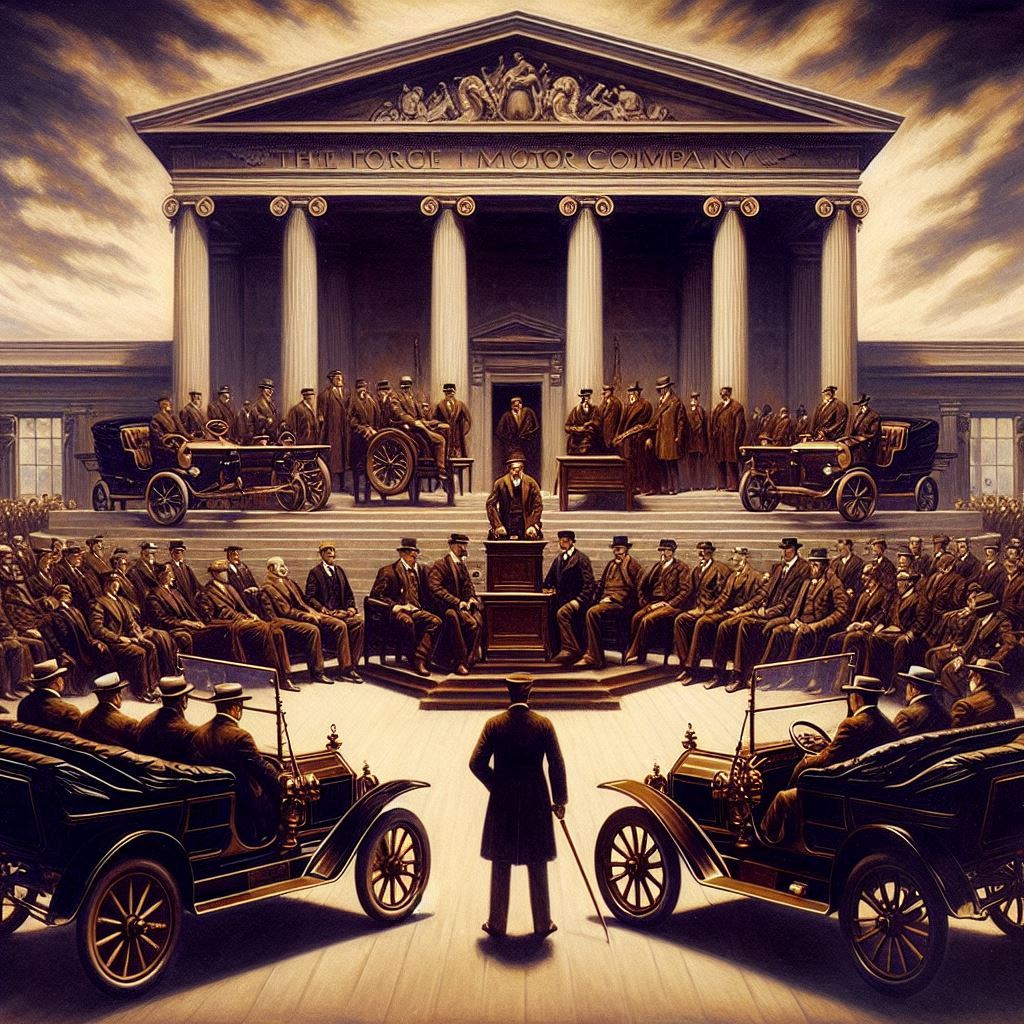Overview:
Dodge v. Ford Motor Co., 204 Mich 459; 170 NW 668 (1919), was a landmark case where the Michigan Supreme Court ruled that Henry Ford must operate the Ford Motor Company in the interests of its shareholders, rather than for the benefit of employees or customers. This case is often cited to affirm the principle of “shareholder primacy” in corporate America, though this concept has faced some criticism. Simultaneously, the ruling upheld the business judgment rule, granting Ford significant discretion in managing the company.
Facts:
By 1916, Ford Motor Company had accumulated a $60 million surplus. Over the years, the price of the Model T, Ford’s mainstay product, had been consistently reduced, while worker wages had dramatically increased. Henry Ford, the company’s president and majority stockholder, sought to stop special dividends for shareholders, favoring substantial investments in new plants. These investments aimed to significantly increase production, boost employment, and further reduce the costs and prices of Ford cars.
Henry Ford’s Public Defense:
Ford publicly defended his strategy, stating, “My ambition is to employ still more men, to spread the benefits of this industrial system to the greatest possible number, to help them build up their lives and their homes. To do this, we are putting the greatest share of our profits back in the business.” Ford believed that while this approach might benefit the company in the long run, shareholder value was not his main consideration.
Minority Shareholder Opposition:
Minority shareholders objected to Ford’s strategy, demanding that he stop reducing car prices, especially when they could barely meet car order demands, and continue paying out special dividends from the capital surplus instead of investing in new plants. Among these shareholders were John Francis Dodge and Horace Elgin Dodge, who collectively owned 10% of the company, making them significant shareholders next to Ford.
Legal Battle:
The Court was tasked with determining whether the minority shareholders could prevent Ford from steering the company in the direction he had declared.
Judgement:
In the opinion written by Russell C. Ostrander, it was noted that the primary concern for company directors should be the profits of the stockholders. Ford could not turn the company into a charity, as that would be akin to misappropriating company assets. The court upheld the trial court’s order requiring the directors to declare an extra dividend of $19.3 million, stating:
“A business corporation is organized and carried on primarily for the profit of the stockholders. The powers of the directors are to be employed for that end. The discretion of directors is to be exercised in the choice of means to attain that end and does not extend to a change in the end itself, to the reduction of profits or to the non-distribution of profits among stockholders in order to devote them to other purposes.”
Significance:
As a result of this decision, Henry Ford threatened to start a competing manufacturer to pressure his adversaries into selling their shares back to him. The money the Dodge brothers received from the case was used to expand the Dodge Brothers Company. Ford aimed to squeeze out minority shareholders, especially the Dodges, who were using their Ford dividends to build a rival car company. By cutting off their dividends, Ford hoped to deprive the Dodges of capital for their growth. Thus, the Dodge decision had mixed results. Ford could not undermine the company’s profitability to eliminate future dividends, but the upheld business judgment rule allowed him considerable control over investments and influence over dividends, though not complete control.
This case is often cited to support the idea that corporate law requires boards of directors to maximize shareholder wealth. However, this interpretation has faced criticism:
Lynn Stout: “Among non-experts, conventional wisdom holds that corporate law requires boards of directors to maximize shareholder wealth. This common but mistaken belief is almost invariably supported by reference to the Michigan Supreme Court’s 1919 opinion in Dodge v. Ford Motor Co.”
M. Todd Henderson: “Dodge is often misread or mistaught as setting a legal rule of shareholder wealth maximization. This was not and is not the law. Shareholder wealth maximization is a standard of conduct for officers and directors, not a legal mandate. The business judgment rule protects many decisions that deviate from this standard. This is one reading of Dodge. If this is all the case is about, however, it isn’t that interesting.”
Jonathan Macey: “While some agree that the case did not invent the idea of shareholder wealth maximization, they find it an accurate statement of the law. Corporate officers and directors have a duty to manage the corporation to maximize profits for shareholders as a default legal rule. Dodge v. Ford is a rule that is rarely enforced by courts, not because it represents bad case law, but because the business judgment rule means the rule of wealth maximization for shareholders is virtually impossible to enforce. The rule is aspirational, except in odd cases. As long as corporate directors and CEOs claim to be maximizing profits for shareholders, they will be taken at their word, because it is impossible to refute these corporate officials’ self-serving assertions about their motives”

